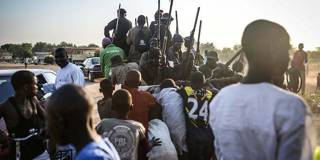The barriers to polio eradication are no longer medical; the disease does not occur where vaccination programs operate unhindered. Successful immunization campaigns must secure the support of de facto political leaders – whether of an internationally recognized state or a of vilified militant organization.
CAMBRIDGE – A few years ago, the global campaign to eradicate polio seemed to have stalled. After decades of eradication efforts, the virus remained stubbornly endemic in Pakistan, Afghanistan, and Nigeria. Then, in 2013 and 2014, it was found to have returned to seven previously polio-free countries in Africa and the Middle East, prompting the World Health Organization to declare the disease’s resurgence a “public-health emergency of international concern.”

CAMBRIDGE – A few years ago, the global campaign to eradicate polio seemed to have stalled. After decades of eradication efforts, the virus remained stubbornly endemic in Pakistan, Afghanistan, and Nigeria. Then, in 2013 and 2014, it was found to have returned to seven previously polio-free countries in Africa and the Middle East, prompting the World Health Organization to declare the disease’s resurgence a “public-health emergency of international concern.”